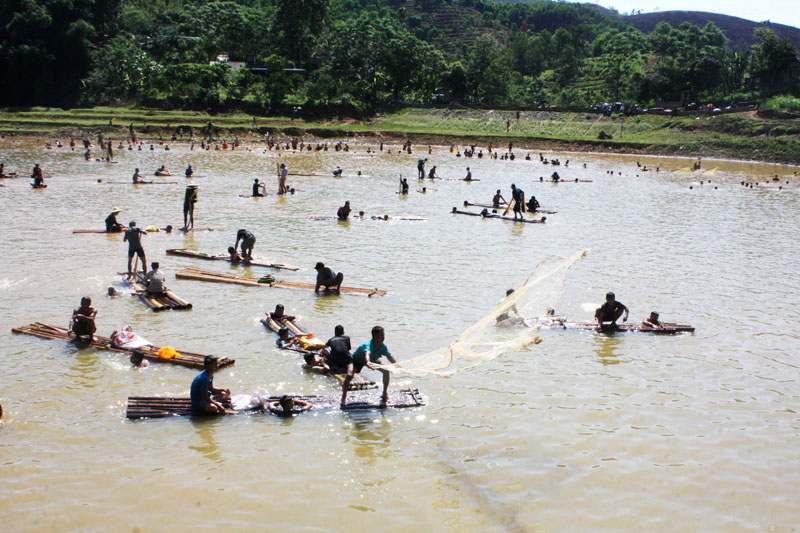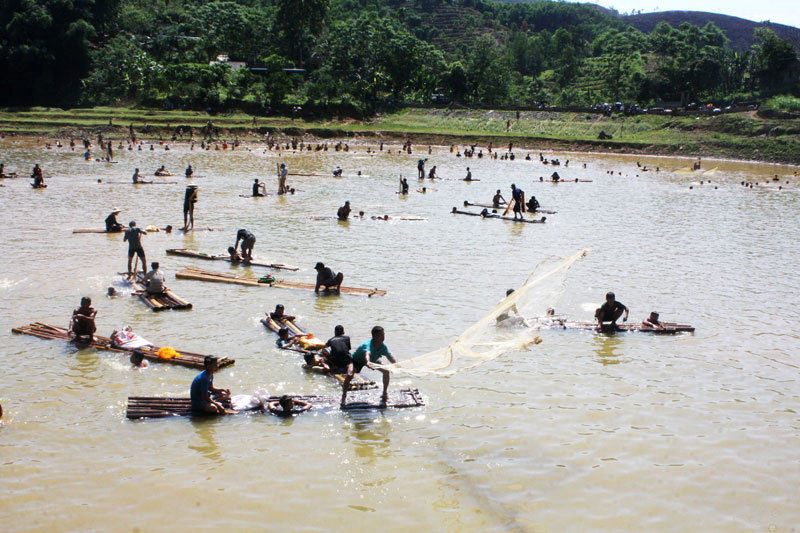
(HBO) – On sweltering summer days, villagers in Lo Son commune, Tan Lac district are busy building rafts and preparing nets for the local fishing festival.
During
the festival, they flock to the Cai River to show off their fishing skills. The
festival has become a regular event, held once or twice a year, offering
leisure time for villagers catching fish for their daily meals and showing
their respect to gods. Besides, it also serves as a chance for them to pray for
favourable weather conditions, bumper harvests and rich fish in rivers and
streams.
In the
afternoon, after rituals performed by the shaman, hundreds of rafts carrying
fishermen rush to the river, to the cheer of thousands of locals and visitors
under the scorching sun which sends the mercury to as high as 40 degrees Celsius.
After the
first day of the festival, many are lucky to catch tens of kilograms of fish
while others go home empty-handed. Yet, they are all happy and say: "See you
tomorrow.”

casting net experts
Suoi Long
Lake in Doi hamlet covers a vast area, 5m-6m deep. Last year, many caught fish up
to tens of kilograms each during the second day of the festival. Therefore,
this year, the lake continued to attract hundreds of rafts. Seeing the fish hunters
from the early morning, Bui Thi Lieng, a resident in Doi hamlet, said: "I am
very happy. Locals brave the heat to keep coming here to cheer the competitors.
Unlike last year’s festival, so far no one has been lucky enough to catch big
fish this year. It may be due to the deep water that makes fish swim to the
river bottom. The festival has helped us relax while offering an opportunity
for us to sell our catches to visitors.”
Apart
from residents in Lo Son, the festival has also attracted skillful fishermen
from adjacent communes. Last year, Bui Van Chuc from Muong 2 hamlet, Do Nhan
district, and five other s in the hamlet teamed up to participate in the
festival. However, this year, he came as a visitor as he had not enough time to
form a team.
"Last
year, I joined several others participating in the festival. We netted more
than 30 kilograms of fish after just a day. I regret not joining this year’s.
The festival is meaningful as it helps preserve our traditional culture, raise
public awareness of ecological protection and prevent illegal fishing
activities” Chuc said./.
With an increasingly vibrant and widespread emulation movement aimed at building cultured residential areas and cultured families, Yen Thuy District has been making steady progress toward improving both the material and spiritual well-being of its people, while fostering a civilized, prosperous, beautiful, and progressive community.
Once lacking recreational spaces and community facilities, Residential Group 2 in Quynh Lam Ward (Hoa Binh City) has recently received attention for the construction of a new, spacious, and fully equipped cultural house. The project followed the model of state support combined with public contributions in both labor and funding.
The "All people unite to build cultural life" movement, which has been effectively integrated with Kim Boi district’s socio-economic development goals, is fostering a lively spirit of emulation across local residential areas, hamlets, villages, public agencies, and enterprises. In addition, through the initiative, traditional cultural values are being preserved and promoted, while community solidarity and mutual support in poverty reduction and economic development are being strengthened.
A working delegation of the Hoa Binh provincial People’s Committee led by its Permanent Vice Chairman Nguyen Van Toan on June 11 inspected the progress of a project to build the Mo Muong Cultural Heritage Conservation Space linked to tourism services in Hop Phong commune, Cao Phong district.
Born and growing in the heroic land of Muong Dong, Dinh Thi Kieu Dung, a resident in Bo town of Kim Boi district, in her childhood was nurtured by the sweet lullabies of her grandmother and mother. These melodies deeply imprinted on her soul, becoming an inseparable part of her love for her ethnic group's culture. For over 20 years, this love for her hometown has driven Dung to research, collect, and pass down the cultural values of the Muong people to future generations.
In the final days of May, the Ethnic Art Troupe of Hoa Binh Province organized performances to serve the people in remote, mountainous, and particularly disadvantaged areas within the province. These were not just ordinary artistic shows, but they were the meaningful journeys aimed at spreading cultural values, enhancing the spiritual life of the people and contributing to the preservation of ethnic minority cultural identities.



